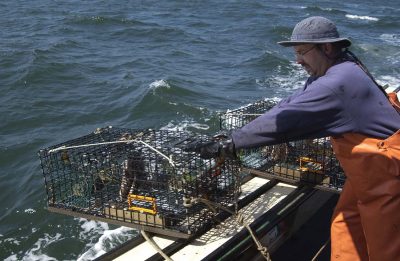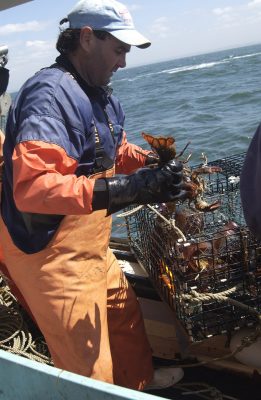
Lessons learned from the 1999 lobster die-off in Long Island Sound will provide the foundation for Connecticut Sea Grant’s contribution to a major Northeast collaboration to enhance understanding of potential changes to the nation’s primary lobster fishery in the Gulf of Maine and Georges Bank.
The four-year Sea Grant American Lobster Initiative, funded by $2 million from the National Sea Grant Program, will support two efforts. A national research competition is supporting seven projects to address critical gaps in knowledge about how the American lobster is being impacted by environmental change. In the complementary portion of the initiative, the Northeast Regional Lobster Extension Program will be led by Maine Sea Grant with six other Northeast Sea Grant programs providing locally relevant components to the project. Its overall purpose is to share knowledge of the biological, economic and social impacts of ecosystem change with current members of the American lobster industry, help build resiliency in the industry, and create opportunities for regional collaborations.
After the 1999 die-off of American lobsters in Long Island Sound, a national competition supported 18 research projects in addition to monitoring outreach efforts, seeking the cause of the widespread mortalities. A synthesis of the research results identified the main causes of the die-off to be a combination of environmental stressors led by sustained warming water temperatures, with secondary factors including enhanced susceptibility to disease. This led to the 90 percent decline in landings that forced many Long Island Sound lobstermen to find alternative livelihoods. This new regional project is motivated by concerns that a similar scenario could occur in the Gulf of Maine and Georges Bank as ocean waters continue to warm, and that lessons learned from the Long Island Sound experience can help lobstermen to the north prepare and diversify. The existing fishery, based primarily in Maine, is one of the largest and most valuable fisheries on the Atlantic coast, with an annual landing value of about $666.7 million.

“We have witnessed the diminishment of the lobster resource in Long Island Sound since 1999, and its failure to rebound to previous levels despite the efforts of lobstermen, resource managers and researchers,” said Nancy Balcom, associate director of Connecticut Sea Grant. “In the Sound, the impacts of a changing climate has had an obvious impact on lobsters at the southernmost end of their inshore range. While we sincerely hope that northern lobster populations are not similarly affected, it’s important to build these collaborations and investigate potential impacts now.”
Working with New York Sea Grant and other extension colleagues in the Northeast, Connecticut Sea Grant will receive about $60,000 over the 2019-2023 span of the project to carry out these seven objectives as part of the Northeast Regional Lobster Extension Program:
- Participate in regional planning calls and meetings of the project and contribute to the design and coordination of regional outreach and extension efforts with lobstermen, researchers and resource managers.
- Participate in the annual research symposium, provide feedback on research and outreach activities and help researchers share their findings with those who can directly benefit.
- Coordinate a special session to share knowledge about past lobster initiatives in Long Island Sound, shell disease that affected the Rhode Island lobster population and other projects that help explain conditions that can harm lobster health and biology.
- Partner with New York Sea Grant to document the history, fishing traditions and changes in perspectives on video interviews with lobstermen, managers and natural and social scientists.
- Produce outreach materials including articles, social medial posts and web content tailored to the needs of regional and Connecticut Sea Grant partners and stakeholders.
- Distribute updates on the progress of regional research and extension efforts to local industry, resource managers and scientists on the progress of regional research and extension efforts.
- Organize a lobster research workshop to share findings of the four-year lobster research initiative with stakeholders in Southern New England.
Aquaculture Extension Specialist Anoushka Concepcion will oversee the project for Connecticut Sea Grant. Local collaborators will include: the state Department of Energy and Environmental Protection; the Connecticut Commercial Lobstermen’s Association; the Southern New England Fishermen and Lobstermen’s Association; commercial fishermen; the Dominion Nuclear Power-Millstone Environmental Laboratory; the Long Island Sound Study and its Scientific and Technical Advisory Committee; non-governmental organizations and academic institutions. Input on proposed activities and outreach will be sought from key Connecticut audiences.
“There are many lessons learned by our Long Island Sound lobster industry which can benefit our neighbors to the north,” Concepcion said. “The collective knowledge assembled by researchers, resource managers and industry tell a story of how various factors, including a changing environment, impacted the lobster species but also highlights how resilient the communities that depended on this fishery are.”
For more information: Judy Benson, Connecticut Sea Grant communications coordinator: judy.benson@uconn.edu